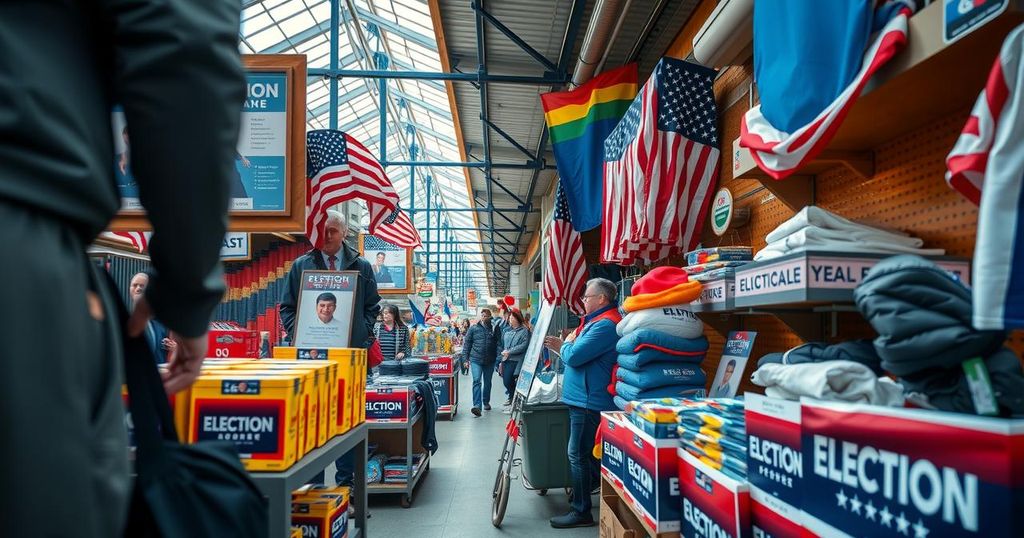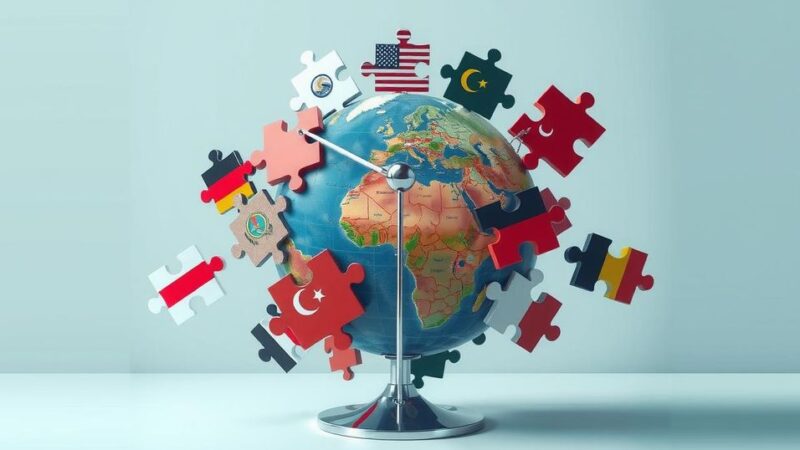As the U.S. presidential election nears, affordable Chinese-made election merchandise saturates the market, challenging American manufacturers. This has raised concerns among producers about competition and economic integrity, particularly with items selling at significantly lower prices on e-commerce platforms. The situation highlights the intricate balance between consumer pricing preferences and the need for domestic manufacturing.
As the United States presidential election approaches its culmination, a significant rise in election merchandise support is being observed among voters. However, many may be unaware that their patriotic items, such as the “Make America Great Again” Trump hats or the “Childless Cat Lady for Harris” T-shirts, are predominantly manufactured in China. E-commerce platforms have enabled Chinese vendors to inundate the U.S. market with competitively priced goods, creating serious challenges for American producers. Ben Waxman, founder of American Roots, expressed concerns regarding the influx of Chinese products affecting U.S. manufacturers. He remarked, “I think the amount of stuff on Amazon and Etsy that’s coming from China and other countries in cargo ships and unloaded on American shores is drastically impacting American manufacturers’ ability to compete and grow our own business. I think it’s dramatic.” Waxman highlighted the price disparity, noting that while his U.S.-made campaign T-shirts retail for approximately $15, similar products sourced from China can cost as little as $3. The vast selection of Chinese-manufactured election goods available online underscores this issue. For instance, thousands of election-themed items can be found on platforms like Temu, significantly undercutting official campaign merchandise prices, such as a Trump hat for less than $4 compared to the $40 charged by the official campaign. Moreover, the stark price differences illustrate broader economic challenges, particularly the de minimis loophole, which permits goods valued under $800 to be imported to the U.S. without paying tariffs. Kim Glas of the National Council of Textile Organizations noted, “the abuse of the de minimis loophole is rampant,” asserting that many domestic manufacturers are facing declining sales in presidential campaign products. Despite attempts to regulate Chinese sellers on major platforms like Amazon and eBay, concerns persist about the impact on American labor and manufacturing practices. Mitch Cahn of Unionwear commented on the irony of U.S. presidential hopefuls advocating for trade reforms with China while their supporters buy Chinese-made merchandise, stating, “If someone is supporting a candidate because of that candidate’s economic policy… and then they’re supporting a candidate by buying a product that’s made in a country that stands for the opposite of that, they’re actually doing themselves and the candidate and the economy a disservice.” Amid ongoing debates about the economic implications of reliant imports, experts recognize the dual nature of this situation; while manufacturing jobs are lost domestically, there exist opportunities for small businesses to utilize Chinese suppliers for swift product availability. Chris Tang, a professor at UCLA’s Anderson School of Management, suggested, “the U.S. should develop a manufacturing sector that focuses on high-value products, not cheap ones such as U.S. election merchandise.”
The article examines the prevalence of Chinese-manufactured election merchandise in the United States as the presidential election approaches. It highlights how the affordability and availability of these products from Chinese suppliers on e-commerce platforms are undermining American manufacturers. The narrative includes viewpoints from industry experts who articulate the detrimental effects of such imports on local production, job loss, and the broader implications of the de minimis loophole in U.S. trade laws.
The significant presence of election merchandise from China exemplifies the challenges facing American manufacturers amidst a competitive global market. Despite efforts to bolster domestic manufacturing, consumer demand for cheaper imported goods continues to shape the landscape of election-related merchandise. This situation raises important questions regarding trade policies and the implications for both the economy and the political sentiments of consumers.
Original Source: www.voanews.com






